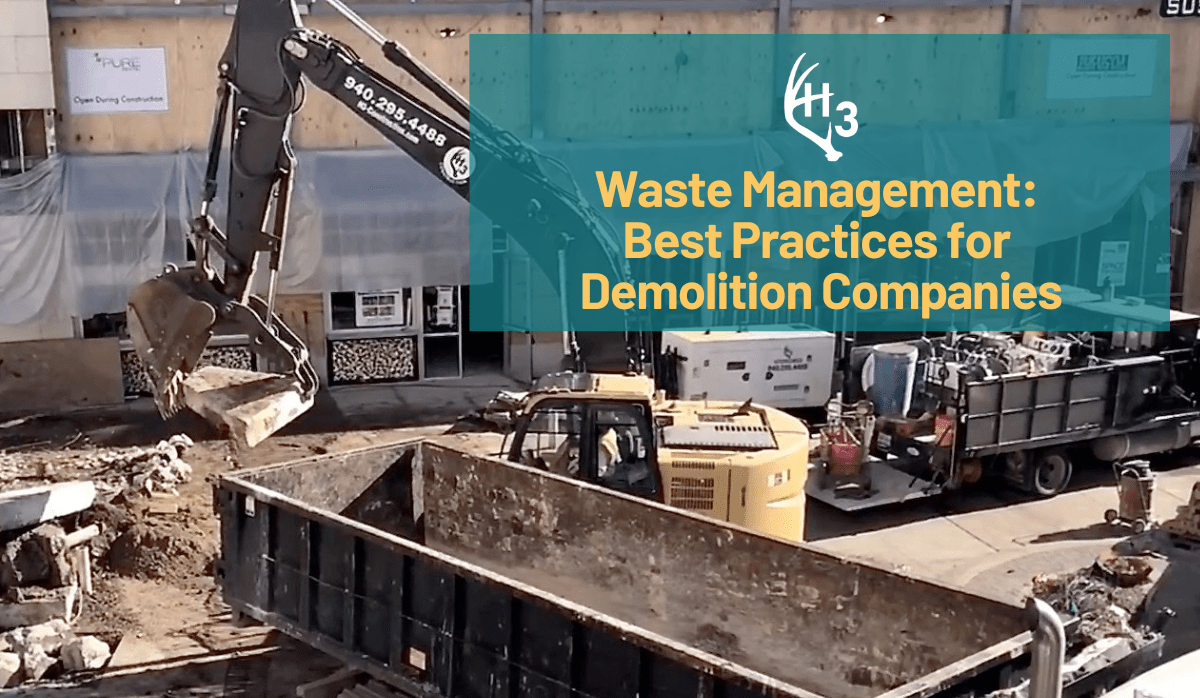Construction and demolition projects can generate significant waste, including concrete, bricks, wood, metal, or hazardous materials. Establishing proper waste management systems increases project sustainability and optimizes worksite safety and efficiency. Below are some of the best practices construction demolition companies should follow to ensure waste removal management, minimize environmental impact, and maximize waste diversion.
Plan for waste management
Effective waste management starts with comprehensive planning. Before any demolition project, develop a waste management plan that includes waste minimization goals, recycling targets, and strategies for hazardous waste handling. Consider waste segregation, container placement, transportation logistics, and local regulations.
Conduct a waste audit
Performing a waste audit identifies the type and quantity of waste generated. This analysis provides valuable insights into waste composition, allowing you to optimize waste management strategies accordingly. By understanding the waste stream, you can prioritize recycling and reuse efforts for materials with high potential.
Emphasize waste segregation
Implement a robust waste segregation system at the worksite. Encourage workers to separate different types of waste into designated containers, such as those for concrete, metal, wood, plastics, and hazardous materials. Clear signage and properly training each crew member help ensure proper waste segregation, prevent contamination, and facilitate recycling efforts.
Prioritize material reuse and recycling
Promote a culture of material reuse and recycling within your construction projects. Retain and reuse materials whenever possible. Local organizations can often use salvaged materials for charitable projects.
Consider deconstruction instead of demolition
In some cases, deconstruction may be a preferable alternative to traditional demolition. Deconstruction involves carefully dismantling structures to salvage materials, reducing waste, and minimizing environmental impact. Demolition companies should collaborate with contractors and project managers to explore the feasibility of deconstruction methods.
Proper handling of hazardous materials
Pay special attention to hazardous material management. Identify and handle these materials following local regulations and industry best practices. Engage certified professionals to safely remove, transport, and dispose of hazardous waste to protect workers and the environment.
Use efficient transportation and disposal methods
Optimize transportation and disposal practices to minimize fuel consumption and emissions. A well-organized waste management plan will help your crew consolidate waste and reduce the number of trips required for removal.
Educate and involve stakeholders
Educate all project stakeholders, including construction crews, contractors, and clients, about the importance of proper waste management. Encourage their active participation in waste reduction efforts and provide training on waste segregation and handling techniques. Fostering a collective commitment to sustainable waste management contributes to project success.
H3 Construction: going beyond other demolition companies
Waste removal, whether from demolition or construction projects, requires careful planning and responsible disposal practices. H3 Construction continues to follow industry best practices when creating and implementing waste removal strategies as a part of our demolition services. Our comprehensive project management approach coordinates all steps of the demolition process, which includes waste removal. By going above and beyond, we continually complete demolition projects within budget and timeline goals while promoting more sustainable construction industry practices.
Start the bid process today to see what we can do to effectively complete your demolition project while expertly coordinating waste removal and supporting sustainability efforts. H3 Construction looks forward to helping resolve your demolition and site development needs.



